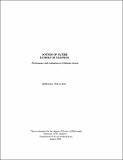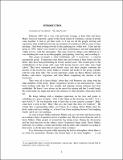Files in this item
Sounds of satire, echoes of madness : performance and evaluation in Cefalonia, Greece
Item metadata
| dc.contributor.advisor | Platt, Tristan | |
| dc.contributor.author | Pollatou, Efpraxia | |
| dc.coverage.spatial | 240 p. | en_US |
| dc.date.accessioned | 2010-09-22T15:14:50Z | |
| dc.date.available | 2010-09-22T15:14:50Z | |
| dc.date.issued | 2009-08-05 | |
| dc.identifier.uri | https://hdl.handle.net/10023/1016 | |
| dc.description.abstract | This thesis is about the construction of 'satire' as an exclusive practice among the Cefalonian and hence proposes the term satiricity (satirikotita). It explores the construction of the category of the Cefalonian "madman" by means of dialogics between performance and evaluation. It is observed that the relation depends on three principles that obtain among audience members and a performer: conditioning the performance, participation in and observation of the performance and evaluation of it. Being one of the few anthropological studies on the Ionian islands of Greece, this thesis aims to contribute to the anthropology of the Ionian islands and of Cefalonia in particular. It looks at the relation between a town and a village on the ground of teasing events and refutes the argument of satire as an urban phenomenon only. It sets the elementary principles towards anthropology of satire and emphasizes the importance of studying everyday teasing events. It also contributes to understanding a 'native' researcher's presence in different ways. Satiricity is seen as a 'par excellence' feature that Cefalonians have. No matter if Cefalonia is a part of the Greek nation-state and people follow 'modern Greek culture', they still employ satiricity as a way of distancing themselves from Greeks. 'Distance' is forged on the basis of absolute exclusion of Greeks from having, practising and understanding satiricity in the way that Cefalonians do. The Conclusions leave the ground open for more investigation on teasing events and application of such viewpoints around other areas of the island, and of the Ionian islands or other Greek islands. I also point to studies looking at island and mainland teasing events and potential differences. After all, we need to examine not only how people construct the claim on the exclusivity of 'satire'. We need to examine how such a claim is applied, supported or contrasted and possibly rejected when Cefalonians engage with other Greeks away from the island. | en_US |
| dc.language.iso | en | en_US |
| dc.publisher | University of St Andrews | |
| dc.relation | en_US | |
| dc.subject | Anthropology at home | en_US |
| dc.subject | Satire | en_US |
| dc.subject | Satiricity | en_US |
| dc.subject | Performance | en_US |
| dc.subject | Teasing event | en_US |
| dc.subject | Metacommunication | en_US |
| dc.subject | Coffeehouse | en_US |
| dc.subject | Marketplace | en_US |
| dc.subject | Social geography of satire | en_US |
| dc.subject | Audience | en_US |
| dc.subject | Illiterate | en_US |
| dc.subject | Laughterscape | en_US |
| dc.subject | Sounds | en_US |
| dc.subject | Devil | en_US |
| dc.subject | Madness | en_US |
| dc.subject | Belonging | en_US |
| dc.subject | Cefalonia | en_US |
| dc.subject | Greece | en_US |
| dc.subject.lcc | HN650.5C4P7 | |
| dc.subject.lcsh | Cephalonia Island (Greece)--Social life and customs | en_US |
| dc.subject.lcsh | Joking relationships--Greece--Cephalonia Island | en_US |
| dc.subject.lcsh | Satire, Greek (Modern)--Greece--Cephalonia Island | en_US |
| dc.title | Sounds of satire, echoes of madness : performance and evaluation in Cefalonia, Greece | en_US |
| dc.type | Thesis | en_US |
| dc.contributor.sponsor | Vergotis Foundation of Cefalonia, Greece | en_US |
| dc.type.qualificationlevel | Doctoral | en_US |
| dc.type.qualificationname | PhD Doctor of Philosophy | en_US |
| dc.publisher.institution | The University of St Andrews | en_US |
This item appears in the following Collection(s)
Items in the St Andrews Research Repository are protected by copyright, with all rights reserved, unless otherwise indicated.


